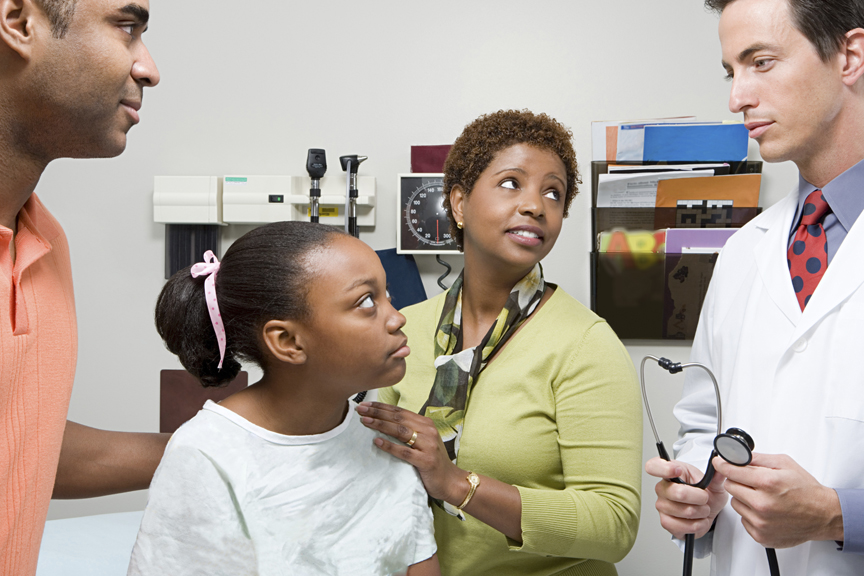- Behavior
- Health
- Parenting
How to reassure your child as changes of puberty approach

In this article, you’ll find answers to questions like:
1. Why dive in early?
2. What's the best approach?
3. How to ease those talks?
You know your children best, as the experts at KidsHealth point out.
For example, you’ll notice when they start telling sexual jokes or when they become concerned with their personal appearance. This is a good time to jump in with questions, such as:
- Are you noticing changes in your body?
- Are you having strange feelings?
- Are you sad sometimes and don't know why?
1. WHY DIVE IN EARLY?
An annual physical exam is a great time to talk about this. A doctor can tell your pre-adolescent — and you — what to expect in the next few years. An exam can be a catalyst for a good parent-child discussion. The later you wait to broach these talks, the more likely your child will form misconceptions or become apprehensive of physical and emotional changes.
It’s important to establish their body isn’t shameful, especially their private parts, says Eleanor Weekes, former supervisor of Therapy Services at Community Partners, a Palm Beach County nonprofit organization funded by Children’s Services Council. “The earlier you start, the less stigma there will be.”
2. WHAT'S THE BEST APPROACH?
Eventually, when you notice changes associated with puberty, maintaining open and non-confrontational dialogue is key, she says.
“Let your child know what they are experiencing is part of their developmental process and that everyone goes through it,” she say. “If there are hygiene issues, depending on what it is, you should take that opportunity to teach your child how best to care for their bodies.”
3. HOW TO EASE THOSE TALKS?
Weekes reminds parents it’s vital to keep an open mind when talking with your children about sexual health and puberty.
“In general, if parents have an open relationship talking with their kids about their bodies when they are young and they keep talking with them, it makes it easier to have these conversations with them as they get older,” she says.
You might want to remind your children that nobody, including close friends and relatives, may touch their private parts, according to HealthyChildren.org. The exceptions are doctors and nurses during exams and parents when trying to find the cause of any pain in the genital area.
SOURCES:
• Eleanor Weekes, former supervisor of Therapy Services, Community Partners
• KidsHealth
• HealthyChildren.org
You May Also Like
-
- Behavior
- Health
- Parenting
Six tips for fostering healthy conversation on tough topics
Sometimes it can be hard to know where to start when having a difficult or awkward discussion with your kids. These tips revolving around a designated safe space may help. …
Read More -
- Behavior
- Parenting
- Safety
Encourage your children to stand up to make a bully sit down
A key part of bullying prevention is encouraging children to speak out, not only for themselves, but also for others. One out of every three children is bullied, so read on for adv …
Read More -
- Education
- Health
- Parenting
Your 5- to 8-year-old sleeping enough? And how does it help?
Ten to 13 hours a day, including naps, are recommended for 5-year-olds, while 6- to 8-year-olds should get from nine to 12 hours. Read on for more expert sleep advice. …
Read More
Related resources
-
- Behavior
- Parenting
Community Partners
Positive Parenting Program, known as Triple P — free seminars and one-on-one guidance to help families improve their parent-child relationships
561-841-3500 Website Email -
- Behavior
- Parenting
Center for Family Services of Palm Beach County
Positive Parenting Program, known as Triple P, offers free seminars and one-on-one guidance to help families improve the parent-child relationship
561-616-1222 Website Email -
- Health
- Other
Health Care District of Palm Beach County
C.L. Brumback Primary Care Clinics — medical, mental health and dental services at more than a dozen locations through the county, regardless of your ability to pay or whether you have health coverage, including for homeless and migrant populations.
561-642-1000 Website -
- Health
Palm Beach Pediatric Society
An organization of Palm Beach County pediatricians, who are committed to meeting the physical and emotional needs of the children and young adults of Palm Beach County by providing the highest quality of care with compassion and honesty.
(561) 509-5009 Website
